- Home
- Lucius Shepard
AZTECHS Page 5
AZTECHS Read online
Page 5
I was still pissed at Lupe, and my impulse was to tell Zee to save his bullshit for St. Peter or whoever waited beyond the organic distribution points. But the guy was dying. You had to cut him some slack.
“As will you be,” he went on. “Both of you.”
I could think of worse fates than spouting platitudes and smiling in everybody’s face, but not many. Zee’s eyes closed, and I thought he had canceled his reservation, but he heaved a sigh and focused on my face.
“Your purpose is more worldly than mine,” he said. “But it is no less God’s purpose.”
“What do you mean by God?” I asked, trying to make the question seem an inquiry and not a bullshit challenge.
Zee’s happyface smile widened. “Look around you. You are with Him now.”
I saw sand and sage and yellow rock. I saw an iguana scuttling across a patch of ocher sand. God. Why not? I thought. An AI who believed it was God, or God manifest in an AI. Not much difference there.
Lupe put on her professional anchor voice. “Are you suggesting, Zee, that the AI known as Montezuma is, in fact, the entity we think of as El Gran Senor?”
“Every age has its avatar,” Zee said weakly. “Believe what you will now. Faith is your destiny.”
She asked more questions, but Zee said he needed to rest. She gazed at me with wounded devotion, retreating into the persona of the Border Rose. “Eddie! You were mean to me.”
I told her to go fuck herself and eased myself down into a more comfortable position. That’s when, looking past her shoulder, I spotted the rider.
It was watching us from about twenty yards away, about fifteen feet from the rock where Childers was stationed. At that distance I should have been able to make out considerable detail, but as far as I could tell, there was no detail to see. It looked to be the living shadow of a horse and rider. The human form flowed out of the horse’s back. Its movements—the uneasy shifting of the horse’s feet, the rider’s head and torso turning—made me think of animation. Too fluid to be alive. It stepped closer, halving the distance between us, stirring up puffs of dust. Dennard eased his rifle up onto his knees. Childers might have been wedded to his rock the same way the rider was joined to his mount.
Lupe clutched at my shoulder. I felt I was looking deep inside the rider, that its blackness had infinite depth. My hand went to my gun; then I recalled Childers had taken it. The rider was half-again normal size, conveying an impression of enormous menace and power. Ebony; anthracite; pitch; obsidian; there was no word dark enough to describe its blackness. It sat unmoving for a dozen heartbeats, then wheeled about with uncanny suppleness and trotted soundlessly off along the arroyo. I glanced down at Zee. No surprise there.
He was smiling.
We walked south into the blue-dark night toward a point known only to Childers. He and Dennard carried Zee’s stretcher. A half moon was sailing high, and I could see for miles in every direction. The arroyo had given way to rolling hills and we kept to the ridgetops in order to avoid the glittering patches of sand, which had grown more numerous, showing like sprays of diamond on the valley floors, emerging from shadow, bordered by slate-blue slices of ordinary sand. Riders tracked us from adjoining hilltops. There were more of them now. I saw as many as thirty at one time. They would parallel our course for a while, then vanish, only to reappear farther along. Fear pulled at me, but Lupe was so upset, I forced myself to maintain so as to reassure her. Childers seemed unaffected, but as we moved deeper into the AI’s turf, Dennard began to come apart. He took to mumbling what sounded like prayerful incantations and to grunt. The grunts were accompanied by twitches that acted to shift the weight of the stretcher, and this came to annoy Childers. At length he told Dennard to set the stretcher down and got in his face.
“Straighten up, god damn it!” he said. “I don’t need you going primitive!”
Dennard gave him a two-handed push and dropped into a fighting stance.
Childers let out a dry laugh. “You’re in my world, brother. Don’t be an asshole.”
Dennard shed his rifle and pack, and did an all-over flex. He shifted into a deep crouch, his fingertips grazing the sand. “Come get it,” he said. “I ain’t followin’ no more. I saw my face on that thing in the arroyo.”
“Wha-at?” Childers affected a tone of pity such as you might use with a child. “And now you’re scared?”
“I ain’t scared of you, that’s for sure.” Dennard flowed into yet another stance, this slightly more upright, with his back straight and right leg forward. “But I’m no damn fool. I know what’s comin’.”
“You just think you know.” Childers shrugged off his rifle and pack. “Christ Jesus! A fucking hallucination, and you go to pieces. In Guatemala I saw beasts made of human shit feeding on the dead. All it did was make me strong. I saw the sun pierced by arrows—I showered in its blood.”
“You ain’t seen jack,” Dennard said. “I was in Zacapas when the black church burned and the demons flew. A hundred brothers saw the same, and they went zero levels, every damn one ’cept me.”
They began trading brags, an old pitfighting ritual. I had no thought to get between them. Sammy on Sammy suited me fine. With any luck, they’d scrag each other. Lupe clung to me. Frankie secured a good position from which to shoot the fight. Our ratings were probably off the charts.
The ridgetop we were walking was narrow, with a thirty foot slope, and as the two men grappled, I realized that one or both would probably wind up sliding down the slope, landing among the glittery patches of sand curving everywhere below, standing forth against the darker sand like rhinestone scalloping. For what seemed a long while, neither man earned an advantage, fighting almost silently, with just the sound of their labored breathing audible; but at last Dennard slipped beneath Childers’ left arm, got behind him, and applied a chokehold that would have crushed an ordinary throat in seconds. Childers tried to bite Dennard’s forearm, failed, gnashed his teeth. His face darkened, and he clawed at Dennard’s eyes. I was pulling for Dennard. His attitude toward the mission was more or less my own, and I started thinking how to deal with him once Childers was dead. But then Childers’ neck and torso expanded, as if his bones were flexible like a python’s ribs, and this loosened Dennard’s grip. He spun inside the grip and head-butted Dennard, knocking him to his knees; then he seized the front of Dennard’s jacket and hammered him with two chopping right hands. I couldn’t believe Dennard was still conscious. Blood and slobber spilled from his mouth. His eyes rolled. But when Childers threw a third right, he ducked it and locked his arms about Childers’ waist, lifting him into a shoulder carry. I saw him tense, adjusting the hold, preparing to throw Childers off the ridgetop—but he stepped back, lost his footing, and Childers slipped from his shoulder. Overbalanced, Dennard snatched at the air, toppled and went rolling down the slope, coming to rest directly below. As he lay spreadeagled, dazed, the glittering curves that mapped the desert floor began to flow, spreading in a film to cover a considerable section of the desert around him—watching those bright shapes in motion transformed my anxiety to full-blown fear. The fall had busted Dennard up—it took him twenty, thirty seconds to get to his feet, but by then it was too late. He was standing in a slate-blue circle in the midst of a diamond pond. To escape he would have to walk across a molecule-thin carpet of machines. He looked bad. One arm appeared to be broken, and blood was coming from his mouth. He turned within his confining circle, searching for an escape route. A rider was approaching from the west, coming at an easy trot, looking less like something alive than a horse-and-rider shaped hole in a photomural that was sliding past so as to simulate movement. Lupe began to recite a Hail Mary.
“This is your moment, brother!” Childers said. “Live in it.”
The rider stopped ten, twelve feet away from Dennard. They seemed to be regarding one another, but I noticed that Dennard’s eyes were closed. It was a compelling tableau. The bleeding warrior with his Egyptian tattoos, death black and empty on its eyele
ss stallion, and the glittering sand enclosing that blue target circle. I could hear wind troubling the sage, Lupe’s whispered prayer, my own hushed breath. Then Dennard let out a scream, as enraged and shrill as a mother eagle sighting a violated nest, and launched himself at death, an assault knife in his hand. The impact should have driven the rider backward, but it didn’t even tremble. It looked as if Dennard was half-sunk in a tarpit, his back and portions of his legs and arms emerging from an area spanning from the rider’s chest to the horse’s belly. Gradually he sank deeper, until his camo-draped butt was the only thing visible. The absurdity of the sight somehow made it more horrifying. Lupe buried her face in my shoulder. Whether she felt any compassion for Dennard, or if she was merely appalled by the thought that his fate might soon be hers, I had no clue.
“Bet that hurt,” Childers said with satisfaction once Dennard had vanished completely.
I wasn’t so sure. Dennard had gone still at the instant of impact. The contact might have killed him outright, but if he had been alive, he had not shown the least sign of resistance.
Childers clapped me on the shoulder. “Break’s over, Eddie.” He gestured at Zee on his stretcher. “Grab an end.”
“You crazy? I wouldn’t make it a mile carryin’ him.”
“Amazing what a man can do when he’s desperate.” Childers fished in his trouser pocket, pulled out something shiny. “But I can help you out.”
“Fuck is that?”
He showed me the shiny thing—a syrette. “Sammy.”
“Right,” I said. “I’m gonna join the freak brigade. Not a chance.”
“I’m afraid I’m going to have to insist.”
I backed farther away. “Zee’s almost dead. What you need him for, anyway?”
“You never know—he might come in handy.”
Out of the corner of my eye I saw Frankie shooting me, and I heard Lupe giving a commentary. She was standing behind me, doing her Border Rose on-the-spot-with-this-latest-development thing.
“Bitch!” I started toward her and she darted away.
“Eddie,” said Childers reprovingly. “You don’t get mad at a snake for hissing.”
I ignored him. “Lupe…”
“What am I s’posed to do?” she said tearfully. “I can’t do nothin’.”
I couldn’t tell what was going on with her. Maybe she couldn’t tell, either. The spark of emotion that had brought us together was flaring its last beneath the pleats and ruffles of our pretend-lover bullshit. Standing in her disheveled silk blouse, her white slacks, with her hair lifting in the desert wind, she was beautiful and false, a perfect illusion that I had succumbed to. The extent to which I had chumped myself made me feel desolate and uncaring. Why should I worry about her…about anything? I was walking toward death with Sammy. I might as well join him in insanity.
“I’m not asking for volunteers.” Childers came forward, doing his Mister Menace scowl, holding up the syrette.
I looked at Lupe for what I figured would be the last time through sane eyes. “Hit me,” I said.
Childers kneeled beside me as I jabbed the syrette into my arm and stared into my face. “The first time,” he said. “It’s a beautiful thing.”
What he saw, I have no idea. What I saw was everything brand new. Take sand, for instance. It previously had seemed unvarying, uninteresting, but now it had been transformed into a tactical topography, areas of minimal exposure and good footing and so forth. People? I glanced at Lupe and instantly dismissed her as a threat—her face was a mask of weakness and fear. But Zee, though dying, was possessed of a supreme confidence that put me on the alert. I gauged everything in terms of its potential danger to me. Despite what had happened to Dennard, those things I saw that were truly dangerous—black riders, living sand—only supplied my amplified senses with fresh reasons for arrogance. My skin was hot, my heart rate accelerated, yet I felt indestructible. All my senses had been drastically enhanced. Sammy could see a sand-colored spider sitting on rock of the same color thirty feet away, a creature that would have been invisible to that cakeboy Eddie Poe had he been standing next to it. The fragments of Sammy philosophy I’d heard over the years suddenly seemed deep and seasoned ideas, and not the globs of reconstituted Bushido they had once seemed. Whereas before Childers had been somehow pitiable in his strength, when I looked at him now I saw an elder brother who was more adept and powerful than I, not of my blood but a pure relation, one who knew what I knew, who drank from the same reservoir of anger that I drank from, who heard, as did I, the singing of his blood, the whine of the circulatory system orchestrated into a music of red wires. In the back of my mind a voice was squealing that I had lost it, but after a minute or so I didn’t hear it anymore.
“How’s it feel to be human, Eddie?” Childers grinned, and I could not help grinning in return. “The stuff they used to hand out to our brothers back when the war started,” he went on, “it was hardly more than juiced-up amphetamines. But this”—he held up a pack of syrettes, then tossed it to me—“this is the shit. Gets you there quick and keeps you there.” His grin broadened. “You’re going to love it.”
I had to admit the drug was a perfect complement to our moonlit walk. Carrying Zee proved a snap. I was tireless so long as I shot up every couple of hours. Childers kept up a stream of chatter as we went, some of it designed as taunts, reminding me that I was a subordinate, an inferior, and some intended to help me adapt to the wonderful world of Sammy. Tips on how to focus, how to interpret certain sensory information that I’d previously been unable to perceive. I found I was able to compartmentalize his bullshit, store what was helpful, and at the same time to generate and consider my own thoughts, which were conflicted. I knew I was no more than a tool to Childers, and I understood this was his right—he was my commander by virtue of strength and experience, and I was part of a campaign, thus expendable. But despite buying this to a degree, I wanted to stay alive, and toward that end I tried to come up with a plan for killing him. (Perhaps this dichotomy was in part responsible for the middling success Sammy was having in a war against an outgunned, outmanned populace to the south.) However, I had no luck in developing a plan. I recognized that Childers—accustomed to derangement—could both outfight and outthink me in this condition. All I could do was hope for a circumstance to arise in which he was placed at a disadvantage. It would have to be a hell of a disadvantage if I was to stand a chance. Of course it was possible that the AI would kill him, but Montezuma’s plan was even less in evidence than my own.
At dawn we stopped to rest in the shade of an enormous rock that stood by itself on a stretch of hardpan. Shaped like a Go counter, flat on top and bottom, with a smooth bulge all the way around its sides. It did not appear to be a natural formation, but Childers displayed no hesitancy in approaching it, and I deferred to his judgment. Frankie scurried up the side of the rock and disappeared. Lupe collapsed beneath the overhang. We laid Zee beside her. I sat down a few feet away, plucked a syrette from the pack and gave myself a boost. Childers chuckled. I imagined he was still wrapped in nostalgia, hearkening back to the infant stages of his own addiction. When I was done fixing, he said, “All right, people. I’m going to do a little recon, scope things out. I want you to stay right here. You move, and I will know about it. We clear?” Then he strolled off out of sight around the rock.
The sky above had gone the blue of old washed-out jeans, and the hardpan had turned blood red, and the sun, partway up, was already distorted by heat haze, a rippling crimson bubble welling from the horizon, heralded by tiers of low cloud stained mauve, peach, and burnt orange. It—the entire panorama—was like a design on a flag, the one flying inside me, its colors and shapes knitted from the new feelings that were consuming the corpse of my former personality cell by cell, eliminating all but the essence of the human, the basic aggression and will to live that, in everyone but Sammy, had been drowned in softness. It was the emblem of a world in which I was the only thing that mattered. I cared nothing
for anyone except for those who might help keep me alive—the trouble was, of the three people with me, I couldn’t decide if any of them fit that category. I was calm. Anger was great in me, but I had no need for anger, and I was content to wait for an opportunity use it. To watch the shadowy hills in the west acquire detail and color, and the sky lighten to a frail blue. To feel a hot wind rise in the east an instant before a speckled lizard resting on the hardpan lifted its head in response to that same stirring.
We had been resting for about a half hour when Zee began to talk. Nonsense at first. A few muttered phrases, and he lapsed. Then he started up again with a bit more coherence: “I don’t…understand…” He licked his lips, his eyes fluttered open, and he saw me. “The city,” he said, and one of those beatific smiles washed some of the weakness from his face. “He has built you a city. And you will build him one.”
Lupe was lying on her side, watching him not with journalistic intent, but with the mild curiosity of the exhausted.
“You make perfect mourners,” Zee said. “Neither one of you has the capacity to mourn, and truly, there is nothing to mourn.” I thought he was about to laugh, but he choked instead.
I had an Eddie Poe thought behind a Sammy-type perception—that Zee had told us the truth, and he was the same man he had always been. As the layers of life were peeled away, I could see he was the same all the way through and that he had been who he was for a very long time. That was what made him dangerous.
A tiny bird winged low overhead, its wings whirring. I saw its throat pulse as it passed, and its black eye glisten.
Zee faded out again, and Lupe once more closed her eyes. A vulture began circling a spot out beyond the edge of the hardpan, one marked by several organ-pipe cacti standing in partial silhouette against the lightening sky. Being Sammy was not without its aesthetic side. I was discovering that I had an appreciation for the desolate, the stark. This may have had something to do with the fact that such landscapes offered relatively unimpeded fields of fire, but I took immense pleasure in the desert view nonetheless—it resonated with my own bleakness of purpose.

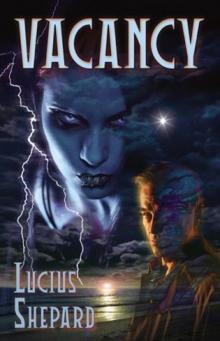 Vacancy & Ariel
Vacancy & Ariel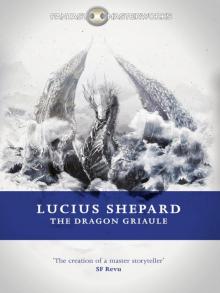 The Dragon Griaule
The Dragon Griaule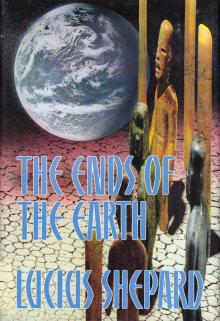 The Ends of the Earth
The Ends of the Earth Two Trains Running
Two Trains Running Life of Buddha
Life of Buddha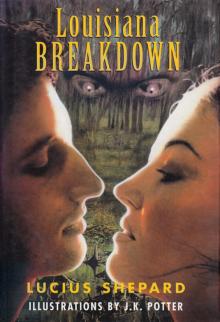 Louisiana Breakdown
Louisiana Breakdown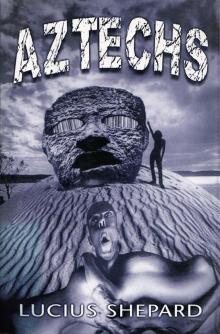 AZTECHS
AZTECHS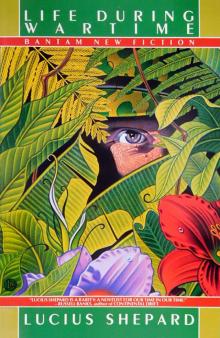 Life During Wartime
Life During Wartime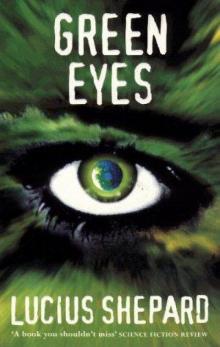 Green Eyes
Green Eyes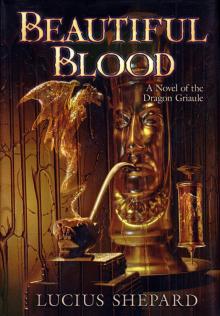 Beautiful Blood
Beautiful Blood Stars Seen Through Stone
Stars Seen Through Stone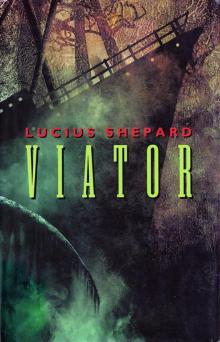 Viator
Viator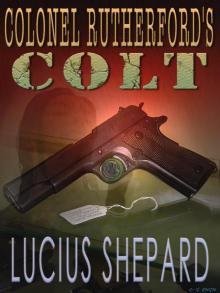 Colonel Rutherford's Colt
Colonel Rutherford's Colt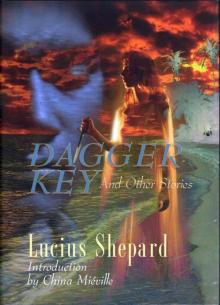 Dagger Key and Other Stories
Dagger Key and Other Stories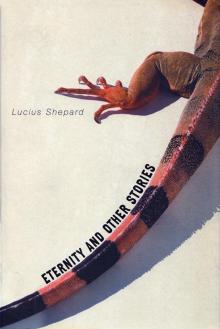 Eternity and Other Stories
Eternity and Other Stories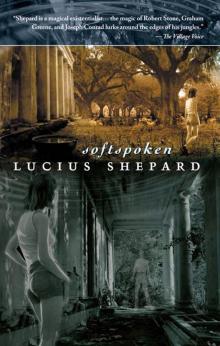 Softspoken
Softspoken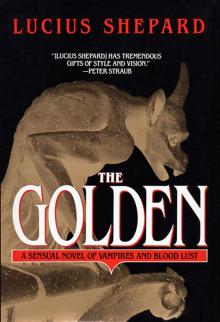 The Golden
The Golden